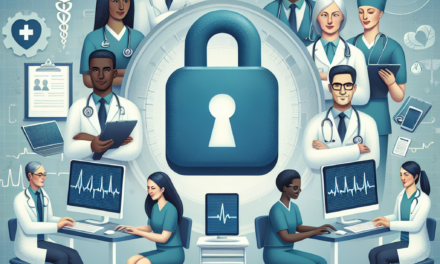Intermountain Health Appoints New Chief Digital and Information Officer
In a significant move aimed at enhancing its digital health initiatives, Intermountain Health has appointed a new Chief Digital and Information Officer (CDIO). This strategic decision reflects the growing importance of digital transformation in healthcare, particularly in the wake of the COVID-19 pandemic, which has accelerated the adoption of technology in patient care. This article delves into the implications of this appointment, the role of a CDIO in healthcare, and the broader context of digital health trends.
The Role of a Chief Digital and Information Officer
The Chief Digital and Information Officer is a pivotal role within healthcare organizations, responsible for overseeing the integration of digital technologies into clinical and operational processes. The CDIO’s responsibilities typically include:
- Strategic planning for digital health initiatives
- Implementation of electronic health records (EHR) systems
- Data analytics and management
- Cybersecurity measures
- Enhancing patient engagement through digital tools
As healthcare continues to evolve, the CDIO’s role has become increasingly critical. The new appointee at Intermountain Health will be tasked with leading the organization’s digital strategy, ensuring that technology is leveraged to improve patient outcomes and operational efficiency.
Strategic Planning for Digital Health Initiatives
One of the primary responsibilities of a CDIO is to develop a comprehensive digital health strategy that aligns with the organization’s overall mission and goals. This involves assessing current technologies, identifying gaps, and determining the best solutions to enhance patient care.
For instance, Intermountain Health has been at the forefront of telehealth services, which surged during the pandemic. The new CDIO will need to evaluate the effectiveness of these services and explore opportunities for expansion. This could include:
- Integrating telehealth with in-person visits for a hybrid care model
- Expanding access to specialists through virtual consultations
- Utilizing remote monitoring tools for chronic disease management
Moreover, the CDIO will need to stay abreast of emerging technologies such as artificial intelligence (AI) and machine learning, which can provide valuable insights into patient data and improve decision-making processes.
Implementation of Electronic Health Records (EHR) Systems
The transition to electronic health records has been a game-changer in the healthcare industry. A CDIO plays a crucial role in overseeing the implementation and optimization of EHR systems. This includes ensuring that the system is user-friendly for healthcare providers and that it meets regulatory requirements.
Intermountain Health has invested heavily in its EHR system, which is designed to streamline workflows and enhance patient care. The new CDIO will be responsible for:
- Training staff on the effective use of EHR systems
- Monitoring system performance and user satisfaction
- Implementing updates and new features based on user feedback
Additionally, the CDIO must ensure that the EHR system is interoperable with other healthcare systems, allowing for seamless data exchange. This is particularly important for coordinated care, where multiple providers need access to a patient’s complete medical history.
Data Analytics and Management
Data is a valuable asset in healthcare, and the CDIO must harness its potential to drive improvements in patient care. This involves implementing robust data analytics tools that can analyze patient outcomes, operational efficiency, and financial performance.
For example, Intermountain Health has utilized data analytics to identify trends in patient care and outcomes. The new CDIO will need to build on this foundation by:
- Developing predictive analytics models to anticipate patient needs
- Utilizing data to inform clinical decision-making
- Implementing dashboards for real-time performance monitoring
Moreover, the CDIO must ensure that data management practices comply with regulations such as the Health Insurance Portability and Accountability Act (HIPAA), which protects patient privacy and data security.
Cybersecurity Measures
As healthcare organizations increasingly rely on digital technologies, the threat of cyberattacks has grown. The CDIO must prioritize cybersecurity to protect sensitive patient information and maintain trust in the organization.
Intermountain Health has faced cybersecurity challenges in the past, making it imperative for the new CDIO to implement robust security measures. This includes:
- Conducting regular security assessments and audits
- Training staff on cybersecurity best practices
- Implementing advanced security technologies such as encryption and multi-factor authentication
Additionally, the CDIO must develop an incident response plan to address potential breaches swiftly and effectively, minimizing the impact on patients and the organization.
Enhancing Patient Engagement through Digital Tools
Patient engagement is a critical component of quality healthcare. The CDIO must leverage digital tools to enhance communication and interaction between patients and providers. This can lead to improved patient satisfaction and better health outcomes.
Intermountain Health has already made strides in this area by offering patient portals that allow individuals to access their health information, schedule appointments, and communicate with their healthcare team. The new CDIO will need to:
- Expand the functionality of patient portals to include telehealth options
- Implement mobile applications for easier access to health resources
- Utilize social media and other platforms to engage with patients
Furthermore, the CDIO should explore innovative approaches to patient engagement, such as gamification and personalized health recommendations, to motivate patients to take an active role in their health.
The Importance of Digital Transformation in Healthcare
The appointment of a new CDIO at Intermountain Health underscores the critical need for digital transformation in the healthcare sector. The COVID-19 pandemic has accelerated this trend, forcing organizations to adapt quickly to new technologies and patient expectations.
Accelerated Adoption of Telehealth Services
Telehealth has emerged as a vital component of healthcare delivery during the pandemic. Patients have become accustomed to virtual visits, and many prefer this model for its convenience. According to a report by McKinsey, telehealth utilization stabilized at levels 38 times higher than before the pandemic.
Intermountain Health has been a leader in telehealth services, offering virtual visits across various specialties. The new CDIO will need to build on this momentum by:
- Expanding telehealth services to underserved populations
- Integrating telehealth with in-person care for a seamless experience
- Utilizing data to assess the effectiveness of telehealth interventions
By prioritizing telehealth, Intermountain Health can improve access to care and enhance patient satisfaction.
Emphasis on Patient-Centered Care
Digital transformation in healthcare is not just about technology; it’s about improving the patient experience. The new CDIO will play a crucial role in ensuring that digital initiatives are centered around patient needs.
For example, Intermountain Health has implemented patient feedback mechanisms to gather insights on their experiences. The CDIO can leverage this feedback to:
- Identify areas for improvement in digital tools
- Enhance communication strategies with patients
- Develop personalized care plans based on patient preferences
By focusing on patient-centered care, Intermountain Health can foster stronger relationships with patients and improve overall health outcomes.
Integration of Artificial Intelligence and Machine Learning
Artificial intelligence (AI) and machine learning (ML) are transforming healthcare by enabling more accurate diagnoses, personalized treatment plans, and predictive analytics. The new CDIO will need to explore how these technologies can be integrated into Intermountain Health’s operations.
For instance, AI can be used to analyze patient data and identify patterns that may indicate potential health issues. This proactive approach can lead to earlier interventions and better outcomes. The CDIO should consider:
- Implementing AI-driven tools for clinical decision support
- Utilizing ML algorithms to predict patient readmissions
- Exploring natural language processing for improved documentation
By harnessing the power of AI and ML, Intermountain Health can enhance its clinical capabilities and improve patient care.
Focus on Data Interoperability
Data interoperability is essential for coordinated care, allowing different healthcare systems to share information seamlessly. The new CDIO will need to prioritize interoperability initiatives to ensure that patient data is accessible across various platforms.
Intermountain Health has made strides in this area, but there is still work to be done. The CDIO should focus on:
- Collaborating with other healthcare organizations to establish data-sharing agreements
- Implementing standards for data exchange, such as Fast Healthcare Interoperability Resources (FHIR)
- Ensuring that EHR systems are compatible with external platforms
By improving data interoperability, Intermountain Health can enhance care coordination and improve patient outcomes.
Commitment to Cybersecurity
As healthcare organizations increasingly rely on digital technologies, the threat of cyberattacks has grown. The new CDIO must prioritize cybersecurity to protect sensitive patient information and maintain trust in the organization.
Intermountain Health has faced cybersecurity challenges in the past, making it imperative for the new CDIO to implement robust security measures. This includes:
- Conducting regular security assessments and audits
- Training staff on cybersecurity best practices
- Implementing advanced security technologies such as encryption and multi-factor authentication
Additionally, the CDIO must develop an incident response plan to address potential breaches swiftly and effectively, minimizing the impact on patients and the organization.
Conclusion
The appointment of a new Chief Digital and Information Officer at Intermountain Health marks a pivotal moment in the organization’s journey toward digital transformation. As healthcare continues to evolve, the role of the CDIO will be crucial in navigating the complexities of technology integration, data management, and patient engagement.
By focusing on strategic planning, EHR implementation, data analytics, cybersecurity, and enhancing patient engagement, the new CDIO can drive meaningful change within Intermountain Health. The broader context of digital health trends, including the accelerated adoption of telehealth, emphasis on patient-centered care, integration of AI and ML, focus on data interoperability, and commitment to cybersecurity, will further shape the future of healthcare delivery.
As Intermountain Health embarks on this new chapter, the leadership of the CDIO will be instrumental in ensuring that technology serves as a catalyst for improved patient outcomes and operational efficiency. The healthcare landscape is rapidly changing, and organizations that embrace digital transformation will be better positioned to meet the needs of patients and thrive in the future.




